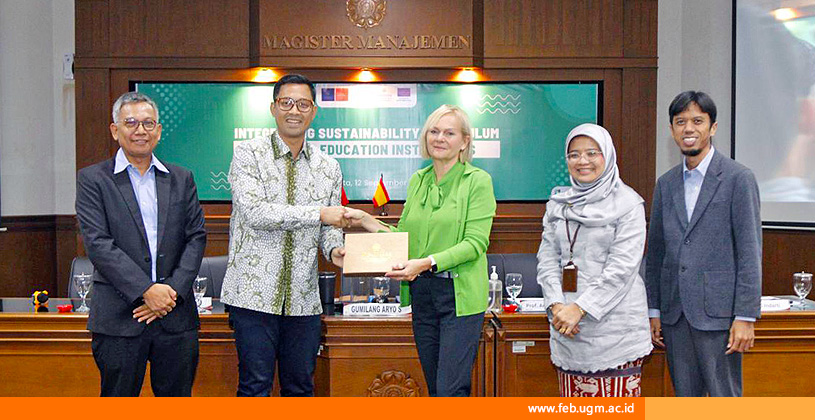Consortium MASUDEM Discusses Development of Master Studies in Sustainable Development and Management Courses
- Details
- Written by Kurnia
- Category: News
- Hits: 189

The Master Studies in Sustainable Development and Management (MASUDEM) consortium held a steering committee meeting to discuss preparing the course framework and syllabus for the MASUDEM program. The steering committee meeting occurred from September 12-15, 2023, at the Magister Management Campus of the Faculty of Economics and Business, Universitas Gadjah Mada (FEB UGM) and Universitas Islam Indonesia (UII).
The meeting was attended by the representatives of the MASUDEM consortium, which includes the University of Economics Bratislava, Universidad Pablo de Olavide (UPO) Spain, Mendel University Brno, Eötvös Loránd University (ELTE) Hungary, The International College of NIDA Thailand, Naresuan University Thailand, Srinakharinwirot University Thailand, Universitas Gadjah Mada Indonesia, Universitas Islam Indonesia, and Universitas Trisakti. Representatives from the University of Agder Norway and the Indonesian Magister Management Program Alliance (APMMI) were also present.
The Steering Committee/Project Manager of MASUDEM UGM, Prof. Nurul Indarti, Sivilokonom., Cand.Merc., Ph.D., stated that the agenda for the four-day meeting was the finalization of Work Package 2. The finalization of Work Package 2 includes the preparation of the course framework and syllabus for the MASUDEM program, the steering committee meeting, and a sustainable industry visit. "MASUDEM is the development of a Master of Management study program that focuses on sustainable development. This program is expected to address and find solutions to climate change issues and sustainable business development for a better future," she explained.
Professor Nurul further explained that graduates of the MASUDEM program are not just analysts but also policy shapers. They are expected to become analysts committed to achieving sustainable development goals. Moreover, graduates are expected to play a crucial role in designing public policies, managing sustainable projects, and contributing to global efforts to address environmental issues, thereby influencing and shaping the future of public policies.
Furthermore, Professor Nurul mentioned that the agenda for the first and second days of the steering committee meeting was the finalization of Work Package 2. Next, on the third day, MASUDEM consortium members conducted an industrial visit focused on sustainability. Finally, on the last day, there was a significant milestone achieved-the presentation and approval of the MASUDEM course framework and syllabus, marking a major progress and achievement for the MASUDEM program.
The sustainable industry visit was held at the Batik Paradise workshop in Jambidan Village, Banguntapan, Bantul, and the Joglo Ayu Tenan recycled jewelry workshop in Pogung Caturtunggal, Depok, Sleman. These industries are environmentally friendly. Batik Paradise prioritizes sustainable production by applying several production standards that minimize negative environmental impacts, from selecting organic raw materials and using eco-friendly dyes to efficient and responsible waste management. Additionally, Batik Paradise empowers residents in the production process to improve the surrounding community's economy and quality of life.
Meanwhile, Joglo Ayu Tenan is a home industry focusing on recycled jewelry crafts that turn waste into high-value art. This industry uses various recycled materials, including metal, glass, and plastic, to create high-value rings, necklaces, and earrings. Not only does Joglo Ayu Tenan offer beautiful products, but it also contributes to environmental sustainability and community empowerment. They empower local communities to recycle waste and create sustainable economic opportunities.
Source: MASUDEM UGM
Editor: Kurnia Ekaptiningrum
Sustainable Development Goals






